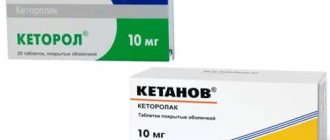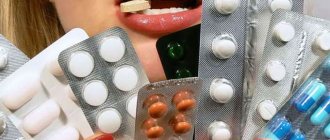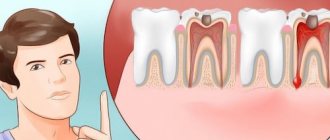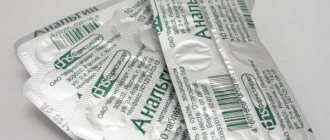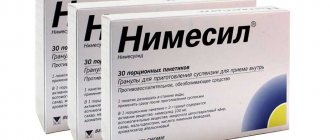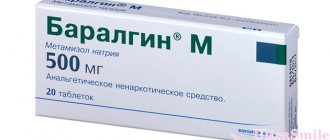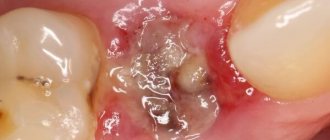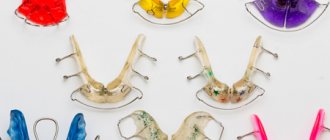What kind of drug is this and how does it work?
Several types of drops are used in dentistry - for teething, for inflammation (for example, gingivitis or periodontitis1), as well as for toothache. In today’s material we will talk specifically about those that relieve pain in the teeth when they hurt.
Drops are used to eliminate pain in the teeth
It is important to know! The product is intended for temporary pain relief if a person is currently unable to visit the clinic - for example, if the pain began in the evening or at night, on weekends or on holidays.
Dental pain drops are taken differently from tablets - i.e. not inside, but outside. To be more precise, the product is applied to the tooth and acts through its surface, and not through the circulatory system. By the way, in addition to relieving pain, the solution for topical use has a locally irritating or “distracting” effect, sedative (calming) and antiseptic properties.
How to soothe an aching tooth?
If aching pain inside a tooth or after the removal of a wisdom tooth prevents you from sleeping peacefully or generally thinking about anything else, you need to take care to reduce it to a minimum. And at the first opportunity, be sure to consult a dentist, because pain relief does not mean that the problem has been eliminated, and there is no need for treatment. You can eliminate pain as follows:
- First of all, thoroughly brush your teeth and remove any remaining food from the interdental spaces.
- Rinse your mouth with a soda-salt solution (a teaspoon of soda and salt per glass of warm boiled water). You can use only saline solution or just warm water if nothing else is available.
- Take a pain reliever (analgin, paracetamol, ibuprofen) if possible.
- If there are no medications at hand, you can relieve pain with folk remedies. Rinsing with decoctions of chamomile, calendula, sage, and calamus root helps to cope well with toothache. You can also use tampons soaked in clove, sea buckthorn or mint oil, which should be applied to the affected area. Rinsing with alcohol-containing liquids - propolis tincture, regular vodka or cognac (sweetened alcohol-containing drinks cannot be used for this purpose!) can help get rid of pain.
It is strictly not recommended to use warming procedures in this case - rinsing should be at approximately room temperature, warm compresses and heating pads should not be applied to the sore area. Heat only accelerates and intensifies the inflammatory process, which can provoke the rapid development of a purulent abscess and the spread of inflammation to nearby tissues.
What's included
The composition of the product consists of only three active ingredients, familiar to almost every person. This includes the following components:
- peppermint leaf oil,
- tincture of medicinal valerian,
- camphor (but not natural, but synthetic).
The drug has plant components.
Most of the mass of the transparent solution is occupied by natural plant substances, which give it a reddish-brown color and a specific smell. The drug is packaged in dark glass bottles of 10-15 ml.
Compound
Preparations in the form of drops have a weak and moderate therapeutic effect regarding toothache. Most often, preparations are made based on natural remedies - peppermint, valerian and camphor. They not only reduce the intensity of pain, but also have anti-inflammatory and antimicrobial effects. Salicylic acid, ethyl alcohol or glycerin can be used as an additional component in the drops.
In combination, all components have several therapeutic effects:
- relieve the symptoms of pain, so that a person can carry out everyday activities;
- inhibit the activity of pathogenic flora and prevent the rapid development of caries;
- reduce the intensity of soft tissue inflammation.
The drug cannot be used as a treatment for dental disease, despite its wide spectrum of action. A person should consult a doctor at the first opportunity, even if the signs of discomfort in the mouth are no longer bothersome.
Can it be used in children?
Manufacturers indicate that toothache drops are indicated only for adults and children over 12 years of age. Moreover, from 12 to 18 years of age, the product should be used with caution. That is, for those children whose age has not yet reached 12 years, this drug is contraindicated - and you need to look for alternatives (for example, tablets and syrups based on ibuprofen or paracetamol).
The use of the drug is contraindicated for children under 12 years of age.
On a note! Children's drops can be used from a very early age - but only if this remedy is not for pain in the tooth itself, but during its eruption. Such drugs include, for example, the “Dantinorm Baby” or “Dentinox” solution.
Contraindications
There are practically no contraindications for dental drops, because their composition is natural. However, we must not forget about the ethyl alcohol they contain. This alcohol can be toxic to children's bodies, so pregnant women should still consult a dentist about the advisability of using this medication.
The dentist will examine you and prescribe the necessary treatment.
In some cases, these drops are prescribed to children for pain in the teeth or when teething - here a doctor’s consultation is also necessary. The same applies to nursing mothers and the use of dental drops during the lactation period.
During lactation, you should definitely discuss the use of dental drops with your doctor.
The instructions for the drops also state that they should not be used by people who have a history of bronchial asthma, epilepsy, or who suffer from seizures.
In addition, before use, you should study the composition of the drug, because its components may cause individual intolerance in some women.
Drops may cause individual intolerance
If a woman is still working and her activity requires concentration, and also if she drives a car, then toothache drops should be used with caution. This especially applies to those who work as dispatchers, equipment operators, and also occupy any other positions that require speed of psychomotor reactions.
During the first trimester of pregnancy, drops should be used with great caution, since ethyl alcohol can negatively affect the formation of the placenta.
In the first trimester you need to use products with caution
Side effects are unlikely, but be aware that they may include the following:
- in the form of headaches, tremors or ataxia;
- in the form of drowsiness during the day and dizziness.
If there are associated factors, bronchospasms or bradycardia may occur. If you apply drops excessively, the mucous membranes may suffer from irritation. In some cases, this leads to damage to the gastric mucosa and heartburn. Allergic reactions may also occur, often local - they manifest themselves in the form of scabies, erythema or urticaria. But some patients may have an immediate allergic reaction - anaphylactic shock.
The consequences of an overdose can be so serious that you will have to call an ambulance
It is very important not to exceed the recommended dosage, otherwise overdose symptoms may appear:
- the appearance of nausea;
- drowsiness;
- dizziness up to loss of consciousness;
- lowering blood pressure;
- the appearance of hot flashes;
- ataxia;
- difficulty breathing and problems with cardiac activity;
- abdominal pain due to disruption of the gastrointestinal tract;
- depressed state of the central nervous system;
- appearance of rectal ulcers.
However, if you follow the instructions for use and properly store this medication, there will be no negative effect on the pregnant woman’s body.
Instructions for use and side effects
You can understand how to use dental drops by reading the brief instructions. Manufacturers recommend moistening a small cotton swab with 2-3 doses of the product (i.e. 2-3 drops) and applying it to the sore tooth. However, this technique does not help some patients; then it is advised to apply 2-3 doses of liquid on a cotton swab and lubricate the entire surface of the diseased tooth.
Manufacturers recommend moistening a small cotton swab
Interesting to know! How to use dental drops for toothache if there is a carious cavity in the tooth (in other words, a “hole”)? Here, experts recommend placing a cotton swab moistened with a solution into the desired cavity - this way the components of the drug will quickly penetrate to the source of pain.
Patient reviews
Lera, 19 years old. Since childhood, my dad has had very fragile teeth: they quickly decay and are acutely sensitive to hot and cold food. Previously, he used painkillers to relieve suffering. Dad crushed the tablets and applied them to the problematic element. Over time, this method stopped helping. Now his only salvation is ordinary dental drops for 35 rubles. When discomfort occurs, dad applies a lotion with the solution to the aching tooth. He experienced relief of symptoms within 10 minutes.
Ilona, 29 years old. After childbirth, the sensitivity of the enamel became greatly aggravated. The peak of toothache occurred during the period when I was breastfeeding my baby. Many painkillers at that time were prohibited for use for me, as their components could pass into breast milk. I couldn’t go to the dentist because the toothache appeared on the weekend. My husband brought a bottle of liquid called “Tooth drops” from the pharmacy. I did not believe in the effectiveness of this product, since its price was only 30 rubles. I used the drops according to the instructions and after 10 minutes I noticed relief from my pain. I was pleasantly surprised by the result, because this inexpensive drug helped me no worse than powerful painkillers. I would like to immediately note that the drug can only be used in emergency cases, after which it is necessary to see a doctor.
Dental drops are a homeopathic remedy that effectively relieves signs of caries, pulpitis, gingivitis and other dental diseases. The drug not only has an analgesic effect, it effectively relieves inflammation and promotes the healing of wounds in the mouth. It is important to remember that medications only temporarily relieve toothache; to completely eliminate the problem, the help of a doctor is necessary.
Precautions and special instructions
Since the drug is prohibited for oral administration, because In this case, it may cause nausea or diarrhea, so it should be kept out of the reach of children. And it is better to use the product away from cats, who react strongly even to the smell of valerian.
Special instructions! The drug reduces concentration, therefore it is not recommended for people whose occupation involves traffic - road, rail, aviation, as well as with dangerous mechanisms, and working at heights.
People with allergies should use the drops with caution.
The presence of plant components in the composition can provoke allergies, especially if a person has a predisposition. Therefore, carefully monitor the body’s reaction - the appearance of a rash, itching, difficulty breathing (especially dangerous!) is a need to stop the drug and see a doctor immediately.
Local remedies
Dental anesthetic ointments, gels and gum creams are the most popular remedies for teething symptoms. They can easily be applied to an inflamed and swollen area on the gum, thereby almost immediately relieving the baby’s discomfort. Often, determining which ointment will work best can only be done experimentally, since each child has individual sensitivity to different components of the product.
Kamistad Gel Baby
Kamistad Baby is a combined dental gel for children with local anesthetic, anti-inflammatory and antibacterial effects. It contains lidocaine hydrochloride and chamomile tincture, which ensure rapid penetration of the gel to the painful area and weakening or complete elimination of pain for some time.
Kalgel
Dental gel, the composition of which is a combination of a local anesthetic - lidocaine with the antiseptic cytilperidinium, which is active against most bacteria and fungi. The action of Kalgel begins 1-2 minutes after application and continues for 10-15 minutes. In case of severe pain, the gel can be reapplied, but it is better not to use it more than 6 times a day. It is possible to use the gel not only to facilitate teething, but also to treat thrush in the child’s mouth.
Dentinox gel
Dentinox is a gel to relieve painful teething of baby teeth. The anesthetic effect is due to the presence of lidocaine hydrochloride in the composition. Additionally, Dentinox has an anti-inflammatory effect thanks to chamomile tincture and polidocanol, which inhibit the growth of pathogens. This gel can be used several times a day, its duration of action is 15 minutes. The drug does not contain sugar and does not have a negative effect on teeth.
Cholisal gel
Dental gel, the main components of which are choline salicylate and cetalkonium chloride, which have a pronounced anti-inflammatory, antibacterial and analgesic effect. To relieve pain, simply spread the gel on the inflamed area of the gum. The special structure of the drug holds it on the surface of the mucous membrane, which ensures its relatively long-lasting effect (up to 2-3 hours).
Popular varieties and their names
Most manufacturers did not change the name of drugs for toothache, which became famous back in Soviet times. Products called “Dental drops” or “Dental drops” can be found in almost any pharmacy. The drug is also produced under the brand name “Dentaguttal”. The composition and concentration of active ingredients in all preparations are the same.
The production of anesthetic solutions is carried out by Russian laboratories - “Moscow Pharmaceutical Factory”, “Yaroslavl Pharmaceutical Factory”, “Ivanovo Pharmaceutical Factory”, “Samaramedprom”, “Tula Pharmaceutical Factory”. There are also several factories producing this product in the CIS countries.
Comparative characteristics of drops and tablets
Which is better: dental drops or painkillers? To answer the question, it is necessary to consider a comparative table of drugs according to several main criteria.
| Criterion | Drops | Pills |
| Compound | Mostly herbal ingredients are added to the drug | Contain chemical compounds with a potent effect (paracetamol, ibuprofen) |
| Therapeutic effect | 5-10 minutes after application | 15-20 minutes after administration |
| Possibility of use during pregnancy | Can be used with the consent of a doctor | Contraindicated in the early stages of pregnancy |
| Side effects | Mostly well tolerated by patients. In rare cases, abdominal pain may occur | They provoke irritation of the mucous membranes of the stomach and lead to exacerbation of chronic forms of gastritis and ulcers. Excessive consumption may cause liver and kidney dysfunction. |
As can be seen from the comparison table, drops are considered safer for health than tablets. For this reason, the drug is often prescribed to relieve toothache in children and pregnant women.
Which is better - drops or tablets, important nuances of use
If we compare drops for toothache and painkillers, then a lot will depend on the initial condition of the tooth and the person’s pain threshold. Dental drops have a quick and effective effect if the “nerve” is preserved in the tooth - a neurovascular bundle in the internal cavity.
But if the tooth was once treated for pulpitis or periodontitis, and now the pain has returned, then tablets will be more effective. Since the dental nerve is no longer present, the drops simply will not work in this case.
In some cases, it is more advisable to use tablets
“I had a bad toothache during the May holidays; we were just visiting my grandmother outside the city - so there were no hospitals or pharmacies nearby. And my grandmother offered me dental drops (I had never even heard of these, but they, it turns out, are considered an old and proven remedy in our family!!) What’s great is that they really helped me “live” these days to the dentist. But my husband tried it a few weeks later and it didn’t work on him.”
Yulia R., 33 years old, review from woman.ru
Why is there a need for dental drops?
Toothache is one of the most common problems with which pregnant women consult doctors. There can be many dental diseases that can cause pain. But most of them are caused by a lack of calcium in the body of the expectant mother. In order for the fetus to develop correctly, it needs a lot of this trace element. And, if a woman does not receive enough calcium from food, her teeth may begin to decay.
Pregnant women often develop tooth decay due to a lack of calcium.
The gum tissue is affected, caries, if it existed before pregnancy, gets worse and can turn into pulpitis. But even one caries is enough for a woman to feel pain. In addition, a carious cavity is always the place where the infection is localized. If it is not cured, it can spread through the blood vessels throughout the body.
It is in those situations when a pregnant woman needs to quickly get rid of a toothache, without risking harm to the baby, that the doctor advises her to use dental drops. They can easily replace drugs with an analgesic effect, which are contraindicated for pregnant women. However, you need to remember that these drops are not a medicine and are not able to fight the very cause of pain - caries or other dental disease. They can only temporarily disinfect the oral cavity and also relieve discomfort.
Dental drops
Despite the fact that the drops contain ethyl alcohol, in some cases they can also be used by women during breastfeeding. In any case, in order not to harm the baby, before using dental drops, you should make an appointment with a dentist. He will determine the cause of the pain and tell you whether dental drops are suitable for relieving it.
